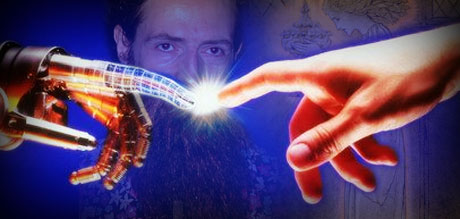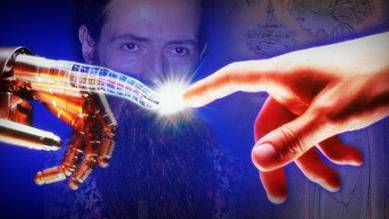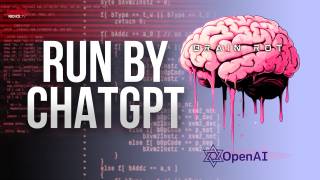Aubrey de Grey, Artificial Intelligence, Singularity, Longevity and the Holy Grail
Interview with Aubrey de Grey at the Singularity Institute for Artificial Intelligence
Aubrey de Grey an interesting guy within the field of AI and biomedical gerontology (the study of aging) to keep an eye on.
Aubrey de Grey
Aubrey David Nicholas Jasper de Grey, Ph.D., (born 20 April 1963 in London, England) is a biomedical gerontologist who lives in the city of Cambridge, UK. He is working to expedite the development of a cure (?) for human aging, a medical goal he refers to as engineered negligible senescence. To this end, he has identified what he concludes are the seven areas of the aging process that need to be addressed medically before this can be done. His main activities at present are as chairman and chief science officer of the Methuselah Foundation and editor-in-chief of the academic journal Rejuvenation Research.
Interesting to note here is that the foundation is named after Methuselah, a patriarch in the Bible said to have reached 969 years of age.
Incidently, as I mentioned in an article about 'Darth Venter' (J. Craig Venter) & The Archon Genomics X Prize, the Methuselah Foundation as it's own contest/prize:
The Methuselah Mouse Prize or Mprize is a growing $4.5 million prize started in 2003 to accelerate research into slowing and reversing cellular aging and breakdown in humans. The Methuselah Foundation awards prizes to researchers who extend the lifespan of a mouse to unprecedented lengths.
Going back to de Grey
Aubrey de Grey was educated at Sussex House School, Harrow School and Trinity Hall, Cambridge. Prior to his work in cellular and molecular biology, he studied computer science. In 1985, he received a B.A. in Computer Science from the University of Cambridge and joined Sinclair Research Ltd as an AI/software engineer; in 1986, he co-founded Man-Made Minions Ltd to pursue the development of an automated formal program verifier. De Grey has never held a teaching position at Cambridge. Until 2006, he was in charge of software development at the Genetics Department for the FlyBase genetic database.
It is perhaps a somewhat far fetched idea to say that Sinclair Research Ltd is connected to the Templar Sinclair's and the search for the Holy Grail... but intriguingly over at the Methuselah Foundation website, they do use a pretty interesting website icon (favorite icon):
It seems to be quite a consistent theme that the search for the Holy Grail is about the search for Eternal life.
Take a look at the related links at the bottom of the page for much more.
More on: Aubrey David Nicholas Jasper de Grey, Ph.D.,
More video interviews from Singularity Institute for Artificial Intelligence
Techies Ponder Computers Smarter Than Us

By Marcus Wohlsen | physorg.com
At the center of a black hole there lies a point called a singularity where the laws of physics no longer make sense. In a similar way, according to futurists gathered Saturday for a weekend conference, information technology is hurtling toward a point where machines will become smarter than their makers. If that happens, it will alter what it means to be human in ways almost impossible to conceive, they say.
"The Singularity Summit: AI and the Future of Humanity" brought together hundreds of Silicon Valley techies and scientists to imagine a future of self-programming computers and brain implants that would allow humans to think at speeds nearing today's microprocessors.
Artificial intelligence researchers at the summit warned that now is the time to develop ethical guidelines for ensuring these advances help rather than harm.
"We and our world won't be us anymore," Rodney Brooks, a robotics professor at the Massachusetts Institute of Technology, told the audience. When it comes to computers, he said, "who is us and who is them is going to become a different sort of question."
Eliezer Yudkowsky, co-founder of the Palo Alto-based Singularity Institute for Artificial Intelligence, which organized the summit, researches on the development of so-called "friendly artificial intelligence." His greatest fear, he said, is that a brilliant inventor creates a self-improving but amoral artificial intelligence that turns hostile.
The first use of the term "singularity" to describe this kind of fundamental technological transformation is credited to Vernor Vinge, a California mathematician and science-fiction author.
High-tech entrepreneur Ray Kurzweil raised the profile of the singularity concept in his 2005 book "The Singularity is Near," in which he argues that the exponential pace of technological progress makes the emergence of smarter-than-human intelligence the future's only logical outcome.
Kurzweil, director of the Singularity Institute, is so confident in his predictions of the singularity that he has even set a date: 2029.
Most "singularists" feel they have strong evidence to support their claims, citing the dramatic advances in computing technology that have already occurred over the last 50 years.
In 1965, Intel co-founder Gordon Moore accurately predicted that the number of transistors on a chip should double about every two years. By comparison, according Singularity Institute researchers, the entire evolution of modern humans from primates has resulted in only a threefold increase in brain capacity.
With advances in biotechnology and information technology, they say, there's no scientific reason that human thinking couldn't be pushed to speeds up to a million times faster.
Some critics have mocked singularists for their obsession with "techno-salvation" and "techno-holocaust" - or what some wags have called the coming "nerdocalypse." Their predictions are grounded as much in science fiction as science, the detractors claim, and may never come to pass.
But advocates argue it would be irresponsible to ignore the possibility of dire outcomes.
"Technology is heading here. It will predictably get to the point of making artificial intelligence," Yudkowsky said. "The mere fact that you cannot predict exactly when it will happen down to the day is no excuse for closing your eyes and refusing to think about it."
Article from: http://www.physorg.com/news108520789.html






















